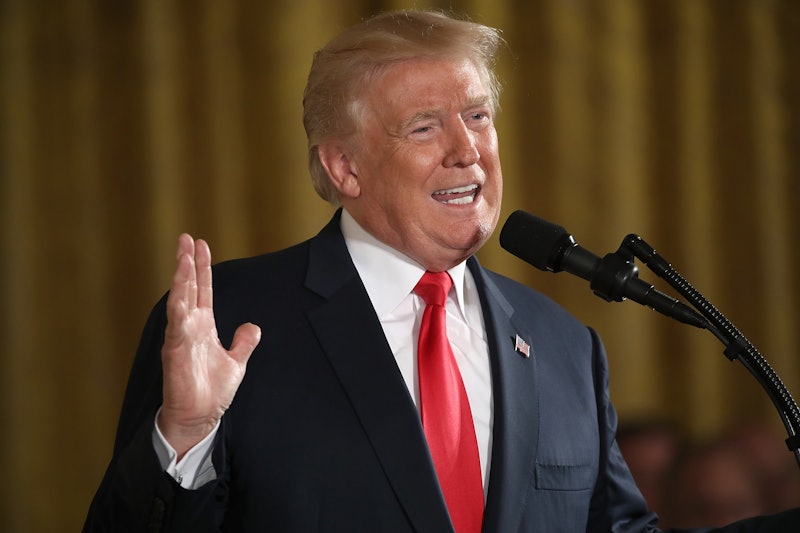News
Trump Finally Approves Sanctions To Punish Russia For Meddling In U.S. Elections

Deciding not to cross a Congress united on this front, President Trump signed the Russia sanctions bill Wednesday morning. The law not only adds new sanctions, but also makes it harder for the president to remove them — a sign that Congressional leaders were worried about Trump's seemingly cozy relationship with Russian leader Vladimir Putin. The bill was in retaliation for alleged Russian interference in the 2016 presidential election, which some argue won Trump the presidency.
There was little-to-no doubt that the president would sign the bill, even if he wasn't happy about it. Any other move would have been hugely difficult politically. The Countering America's Adversaries Through Sanctions Act passed both houses of Congress with huge bipartisan majorities. The Senate passed the bill 98-2 and the House passed it 419-3, the kind of majority that would easily override a veto.
Even so, Trump dragged his heels before signing it. He had the bill on his desk for six days, after all. On Friday, the White House definitively committed to signing, but even so, he bided his time. Sarah Huckabee Sanders, the new White House press secretary, said then that Trump "approves the bill and intends to sign it.” But approval may be a bit of an exaggeration.
Upon signing the bill, Trump attached a statement calling it "deeply flawed," the BBC reported. In the White House's view, it has "a number of clearly unconstitutional provisions," which "purport to displace the President's exclusive constitutional authority to recognize foreign governments, including their territorial bounds." He challenged Congress not to intervene in foreign affairs:
My Administration particularly expects the Congress to refrain from using this flawed bill to hinder our important work with European allies to resolve the conflict in Ukraine, and from using it to hinder our efforts to address any unintended consequences it may have for American businesses, our friends, or our allies.
Secretary of State Rex Tillerson also had a message that varied from Huckabee Sanders' when he spoke with reporters Tuesday: "The action by the Congress to put these sanctions in place and the way they did, neither the president nor I are very happy about that."
He went on to say that Trump accepts Congress' decision, but he did not signal that the president approved of the bill. He said it would be an obstacle to restoring the relationship between the two countries. "We can't let it take us off track of trying to restore the relationship," Tillerson told the gathered reporters.
Russia retaliated over the bill before Trump even signed it. That may have been to show that the retaliation was against Congress and not the president. Putin ordered the United States to cut 755 staff from its embassy and consulates in Russia. Russia also seized two diplomatic compounds. Many of those cut will be Russian support staff, and the State Department has said this could result in long waits for U.S. visas of at least weeks, if not months.
Diplomatic relations with Russia will now be something to watch. Putin faces an adversarial Congress, but a much more amenable executive branch.